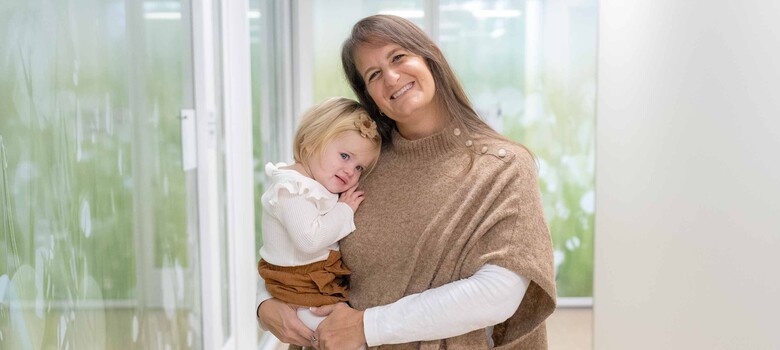KidsCan! Connects Kids to Talk about Parents’ Cancer

Child Life specialist Micah Sedillos spends time with Graham Alexander and his children as they enjoy bubbles and snow cones at a quarterly in-person meet-up of KidsCAN!
The KidsCAN! team approached Graham Alexander and his family shortly after his wife, Elizabeth, was transferred to the Duke Cancer Center from another hospital to further her care for colon cancer. At first, Graham felt reluctant to get involved in the program.
Connecting Kids With Kids Their Age Whose Parents Have Cancer
Provided free of charge by the Duke Cancer Patient Support Program, KidsCAN! connects kids over Zoom and through quarterly in-person gatherings so that they can talk about their parents’ cancer in a safe environment with their same-age peers, ranging from ages 4-18.
“Being the caregiver, my instinct is to protect. I don't want other people talking to my kids about cancer or guiding them through this process. That was my job,” Alexander said. At the time, he thought his children would only talk to professionals, away from him and his wife.
Alexander said his wife changed his mind. “She was the one who prepared the kids for different life events. She was the one who said, ‘This resource is here, we should take advantage of it. We need support.’”
Activity Packets Get Kids Talking
Micah Sedillos, CCLS, co-directs KidsCAN! at Duke Cancer Center Raleigh. She has been a certified Child and Adolescent Life Specialist for 15 years.
“Kids this age tend to not want to be different than their school friends,” said Sedillos. “But they will talk to other kids going through the same thing.”
To help break the ice during monthly meetings, KidsCAN! sends children a packet of materials for therapeutic activities that they do together.
A recent packet featured the book Invisible Strings, by Patrice Karst. Kids can also view a YouTube video of the book read aloud. For the activity, the children wrote names of loved ones on paper hearts, and then linked them with colorful ribbons. They showed each other their hearts by holding them up to their screens.
“The idea is that we are all connected, even when we are apart,” said Sedillos.
Parents Learn by Listening In
The virtual setting makes it easy for parents to stick around. “We encourage them to listen as the kids talk to each other about their experience, often through the lens of an activity they work on during the meeting,” said Sedillos.
Alexander agreed. “We’d be in the background, pretending to do some emails, or my wife would pretend to read a book,” he said. “But really we’d be listening to them. It blew my mind that they knew what the call was about--they knew they were talking about cancer. Yet at the same time, they could have fun playing with Legos, or drawing.”
“I was also surprised by how quickly my kids just jumped in and were ready to talk about cancer, because I wasn’t ready. I felt terrified to talk about cancer with them.”
Alexander said that listening to meetings made him and his wife more comfortable having similar conversations with their children.
In addition to KidsCAN! virtual and in-person events, a virtual Parenting with Cancer group meets monthly.


